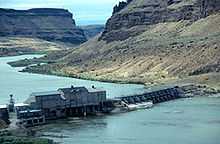Swan Falls Dam
| Swan Falls Dam | |
|---|---|
 | |
| Location | Ada / Owyhee counties, Idaho |
| Coordinates | 43°14′36″N 116°22′46″W / 43.24333°N 116.37944°WCoordinates: 43°14′36″N 116°22′46″W / 43.24333°N 116.37944°W[1] |
| Opening date | 1901[2] |
| Dam and spillways | |
| Impounds | Snake River |
| Length | 1,150 feet (350 m)[3] |
| Height | 107 feet (33 m)[3] |
| Reservoir | |
| Total capacity | 7,425 acre feet (9,159,000 m3)[3] |
| Catchment area | 41,900 sq mi (108,520 km²)[3] |
| Surface area | 1,525 acres (6.17 km²)[3] |
|
Swan Falls Dam and Power Plant | |
| Area | 2 acres (0.81 ha) |
| Built | 1900 |
| Architect | Wiley,A.J. |
| Governing body | Private |
| NRHP Reference # |
76000667 [4] |
| Added to NRHP | July 06, 1976 |
Swan Falls Dam is a concrete gravity type hydroelectric dam on the Snake River, in the U.S. state of Idaho. It is located near Murphy, Idaho.
The dam was built in 1901 to generate electricity. It is the oldest hydroelectric dam on the Snake River. In the 1990s the original power plant was replaced with a new one.[2] The dam was built with fish passage facilities, but they proved to be very poor in performance. For this reason, among others, the C. J. Strike Dam, built upriver from Swan Falls Dam in the early 1950s, was not equipped with fish passage facilities. Thus the two dams combined to become the first artificial barrier to anadromous fish migration up the Snake River. Today Hells Canyon Dam is the first total barrier to fish migration on the Snake.[5]
The dam and its reservoir lie within the Snake River Birds of Prey National Conservation Area.[2] The dam and power plant were listed in the National Register of Historic Places.
References
- ↑ U.S. Geological Survey Geographic Names Information System: Swan Falls Dam, USGS, GNIS
- ↑ 2.0 2.1 2.2 Swan Falls Dam, Idaho Power
- ↑ 3.0 3.1 3.2 3.3 3.4 Swan Falls Dam, NPDP Dam Directory
- ↑ "National Register Information System". National Register of Historic Places. National Park Service. 2009-03-13.
- ↑ [http://www.nwcouncil.org/fw/subbasinplanning/lowermidsnake/plan/, Middle Snake Subbasin Plan], Northwest Power and Conservation Council
Further reading
- Swan Falls Dam
- Snake River Hydroelectric Plants
- Historic American Engineering Record (HAER) No. ID-20, "Swan Falls Dam, Snake River, Kuna vicinity, Owyhee County, ID"
| |||||
| ||||||||||||||||||||